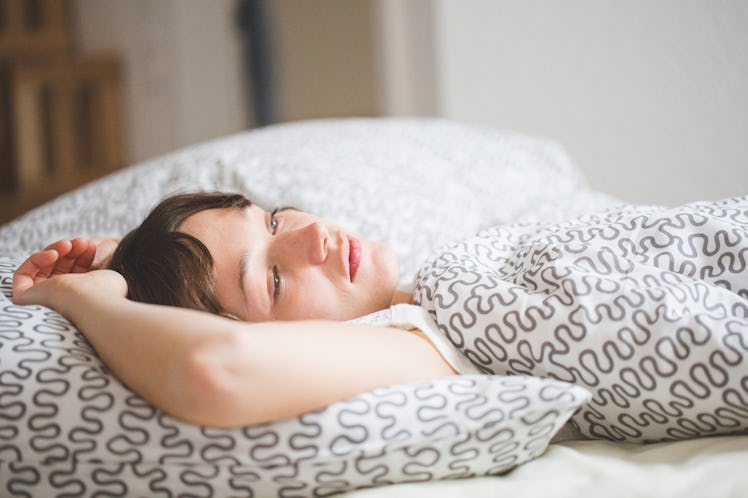
Science Says You Can Blame Evolution For Not Being A Morning Person, So Go Back To Sleep
I hate to break it to you, but we really can’t all be morning people. It’s an admirable goal, for sure, but think of it this way: There aren't enough worms for every early bird to catch one. That’s just life. So if you’ve ever caught yourself wondering why you're not a morning person after years and years of confrontation between yourself and that pesky 6 a.m. alarm, blame life. More specifically, blame science. Why? Because there’s a theory budding among experts that the process of evolution had an impact on human sleep patterns, and doesn’t that sound better than the alternative, which is, you know, the one where you can’t stop binge-watching Stranger Things until 2 a.m. every night?
A quick internet search will result in a handful of studies and hacks detailing what makes a morning person rise out of bed with a smile on their face and not a single shadowy bag hanging from their eyelids. It could be that these people clock in the FDA-recommended six to eight hours of sleep per night, take shots of apple cider vinegar before bed, exercise regularly — the list goes on.
According to a recent study published in the Proceedings of the Royal Society B: Biological Sciences journal in July, we can officially add evolution to that list. And, for the record, humans have little to virtually no control over that, so own your nocturnal nature, friends.
The study analyzed the link between our ancestors’ sleep patterns and modern-day schedules.
Huffington Post reports that researchers observed 33 adults living in a rural hunter-gatherer tribe in Northern Tanzania over a three-week time period. The results showed that more than 99 percent of the time the group slept, at least one adult was awake, and that each individual spent six hours asleep on average, but all at different times during a 12-hour span. Sound familiar?
Depending on our work schedules, social calendars, and even personal preferences, we all go to bed and wake up at different times. According to this study, circumstance is definitely a factor, but our ancestral background plays a key role, too. Co-author David Samson, an assistant professor in the Department of Anthropology at the University of Toronto, Mississauga stated that this research proves that “human sleep is both flexible and variable.”
In other words, morning person or not, you were born this way.
My husband has a really tough time waking up early. Being the early riser that I am, I was quick to blame it on his tendency to stay on the computer past midnight, and I even searched for possible errors in his diet. According to additional research, however, there’s a strong case that morning-loathers are just products of their DNA.
Vox reported in March 2017 that a college student was diagnosed with delayed sleep phase, a rare disorder that can hardwire a person’s internal sleep clock so that it’s completely offset from the rest of the world. The then 21-year-old attending Northern Arizona University apparently cannot fall asleep until 3 a.m., and finds it difficult to start her day before 11 a.m.
Although this particular circumstance is rare, we all have something called a chronotype, which is a preferred sleep schedule we are born with that is influenced by genetics. So while you may desperately want to be a morning person because of certain career aspirations or social obligations, science says it’s probably best not to fight your unique circadian rhythm.
Philip Gehrman, a sleep researcher and clinician at the University of Pennsylvania told Vox, “Sometimes one of the helpful things I do for people is give them permission to follow a late schedule. Because there’s an attitude in our culture that there is something wrong with that.”
It’s no secret that society seems to favor early risers because there’s this assumption that the longer you are awake, the more productive you are. But there’s a difference between being awake and actually being able to function. If your brain struggles to process the world around you until 11 a.m., sleep in.
Still, just because you're not a morning person doesn't mean waking up early has to be painful.
So we’re not all hardwired to rise and shine at 6 a.m. That’s totally fine, but the hard truth is night owls are going to have it rough when an office meeting or class seminar is scheduled early AF, and the only option is to endure it, regardless of genetically assigned chronotype.
Luckily, there are ways in which we can finagle mornings to not feel so brutal. For example, instead of heading to bed at midnight, snuggle under the sheets around 11 or even 10 p.m. to let your body know it’s time to wind down.
You can even prepare yourself for the early morning ahead by drinking a ton of water a few days leading up to that 7 a.m. alarm to keep hydration and oxygen levels up. And while we're on the subject of alarms, do yourself a huge favor and download a tune that makes you feel all the good vibes, because I can guarantee sticking to your smartphone’s default acoustic number will actually make you want to punch a wall by the time the alarm goes off.
Keep in mind, though, that "early to bed, early to rise," isn't for everyone, and that's OK. Just snooze when necessary, and figure out a few ways to make mornings a little easier on you.